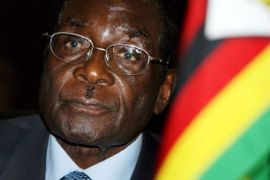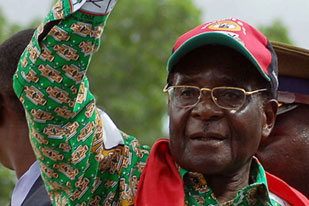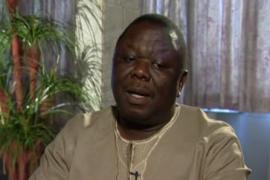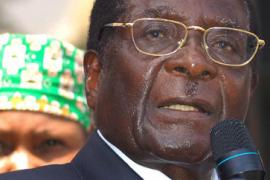Mugabe: The imperative to be right
Heidi Holland, author of Dinner With Mugabe, on the Zimbabwean president.

 |
| Mugabe has been Zimbabwe’s sole president since 1980 [AFP] |
Robert Mugabe, Zimbabwe’s president, is facing the sternest test to his rule since coming to power in 1980.
The opposition Movement for Democratic Change (MDC) has overtaken Mugabe’s Zanu-PF party in parliamentary polls, while Morgan Tsvangirai, the MDC leader, has claimed victory in a presidential poll.
Heidi Holland, a journalist, has interviewed Mugabe at length on two occasions for her latest book Dinner With Mugabe. She talked to Al Jazeera about where Mugabe can go from here.
Al Jazeera: What were your impressions of Robert Mugabe when you met him late last year, compared to your meeting with him 30 years ago?
Holland: I think he is a disillusioned man today. He is a man who came to office with a very utopian view of life and over the years he has had to accept that things have not worked out the way he intended.
Unfortunately, because he is a very intellectual man and not really emotionally grounded at all, his response to disillusionment, rejection and humiliation is anger.
Anger turns to revenge. I think that came through in his answers.
I think I got quite a good insight into quite a bitter man, a man with a lot of grievances; some of which I have to say are founded against the West, and Britain in particular.
The white Rhodesians, who voted against him after he had gone to extraordinary lengths to reassure them, [and] white South Africa destabilised him very early on.
There are many accomplices in the tragedy of Zimbabwe, not only Mugabe.
Does he reflect on his time in power with any regrets?
No. I gave him a couple of opportunities to voice regret and said to him quite directly would he like to place on the record his regret about the massacres of political opponents early on in his rule – there were thousands of them. He said no, it was an uprising that had to be put down.
He regretted any death that should not have occurred, which is hardly an apology.
Zimbabwe has serious problems. The economy is in tatters and people in rural areas are dying of hunger. Does Mugabe see himself in any way to blame?
No. As I say, he is an emotionally stunted person because of his deprived childhood. He had a terrible early life. He didn’t form the strong inner core that one would need as a leader, certainly for that period of time.
 |
| Tsvangirai claims that he won the first round of a presidential election |
He blames everybody else; that is his characteristic response to things going wrong. Also, he has positioned himself so that he lives in a bubble [where] he doesn’t have to take account of reality. People can only be there if they agree with him.
Indeed, when I went into the presidency to be grilled by Mugabe’s spokesperson and intelligence agents, there was a huge placard outside the information office saying “Mugabe is right”.
That is inside the presidency and that gives you some idea of just how imperative it is for Mugabe to be right.
The Movement for Democratic Change (MDC), Zimbabwe’s main opposition party, is saying that its leader Morgan Tsvangirai won the presidential election held last week. Do you think Mugabe will resort to the use of force to stay in power?
I think so. His characteristic response, if you look back over his whole history, is revenge, to humiliation in particular. This has been a humiliating situation for Mugabe to be in.
You’ve seen a lull before the storm; what we’re seeing now is Mugabe coming back with his fists flaying. I really think he is going to fight to the end.
Do you think that Mugabe is losing the support of senior members in Zanu-PF?
Right now he is consolidating his position within Zanu-PF and as leader of the country [but] Simba Makoni, Zimbabwe’s former finance minister, ran against him in this year’s presidential election. He didn’t do well at all – he came last, and had very little impact on the voters. That ploy hasn’t worked.
There are all sorts of factions in Zanu-PF – remember that it’s the most vile organisation. It has a long and troubled and violent history, which goes way back. There have always been schisms and factions in Zanu-PF.
I think what is happening now is that Mugabe is going for broke. His instinct is to fight. I think he is going to organise things over the next few weeks or months so that he will definitely win a run-off [presidential election, against the MDC’s Morgan Tsvangirai]. He’ll do whatever is needed now to secure his position.
Can Mugabe depend on support within the security forces and the military or is there a rising tide of dissent in these organs of the state?
What one understands is that in the middle ranks of the military there are younger people who are not as wedded to the imagery of the liberation war, who are suffering economically, as pretty much everyone there except the upper echelons are. They would be the wild card.
The ones who are at the top [of the military] are the ones with their own blood on their hands.
So could younger people in Zimbabwe, with less memory of the liberation war than older Zimbabweans, be courted by the MDC?
|
My feeling is that Britain needs to engage with its post-colonial legacy, which is personified by Mugabe |
Well, Mugabe is a very clever propagandist. He plays these old tunes over and over again because they have resonance.
He plays that liberation thing because in the rural areas, where there are less well educated people, I think that has a pull. It certainly does with the older military guys.
For example, the aggro against Britain has a lot of resonance all over the continent, in the way that Africa supports Mugabe.
But those middle-ranking military people; yes, I suppose they are a potential flashpoint. When you say “Could the MDC appeal to them?”, I would think there is going to be such a crackdown now that the overarching issue is going to be rule by terror; rule by fear. That shuts down all the space there is to move in.
The election appeared to go off rather well, and there was certainly less violence than there has been in past elections. I think the nature of Mugabe will be to say “Ok – I’ve tried to do it the nice way – but now, you’re going to have the works.”
So if things do not go Mugabe’s way in the next few days or weeks, he is going to try to neutralise the MDC before they can get any political capital from the situation?
Yes, exactly. He has already said that he is contesting 16 seats in the assembly, so obviously he is going to attempt to nullify the MDC victory there. Then he is going to go for a run-off, but only on his terms. His terms will involve an awful lot of violence.
The MDC has called for international intervention to oversee the situation in Zimbabwe. Do you think that such a development is likely?
I think it’s a very good idea. I wrote an op-ed piece this month for the New York Times saying that very thing. I argued that Western diplomacy in respect of Zimbabwe has been absolutely pointless; it hasn’t worked at all.
 |
| Mugabe has said that Britain has interfered in Zimbabwe [AFP] |
The sanctions [imposed by the West] just fuelled Mugabe’s propaganda machine. He was able to make a fact of them, even though they were so mild, and so they worked for him.
My feeling is that Britain needs to engage with its post-colonial legacy, which is personified by Mugabe. He is an 84-year-old man; he spent the first part of his life working under British rule, he was educated by Catholics at an imperialist institution.
A lot of stuff that you see coming out of Mugabe – the anger – is an accumulation of all that he has internalised, the grief, the pain, the resentment. I think the British should engage with Mugabe; I have thought that for some time. Of course, they won’t because they don’t really care.
The next thing would be either the European Union or the United Nations. There is a lot of resistance to engaging with Mugabe. People don’t like it. A lot of people said after my New York Times piece that I was condoning Mugabe and his human rights abuses, but I’m arguing to Zimbabwe’s future rather than Mugabe’s past. That’s what I feel the international community should start looking at – are we interested in Zimbabwe’s future or are we interested in punishing Mugabe for his past?
I spend two-and-a-half hours with Mugabe and he is so aggrieved about Britain – and with some cause, actually. Maybe people should get off their high horses at this stage. I think people think Zimbabwe can’t get much worse, but it can.
What do you think will ultimately lead Mugabe to step down?
His death? Of old age, probably. I don’t know. I don’t want to predict. The point is that the West really needs to explore to talk Mugabe out of office. It may not work, and he is very angry now because the triggers for his anger are rejection and humiliation. This exercise at the polls has pushed both of those buttons. He’ll really be on the warpath now, for sure.
If he got a call from Downing Street, as odd as that may sound, that would answer his prayers now, in a way. The guy is really quite precariously balanced.